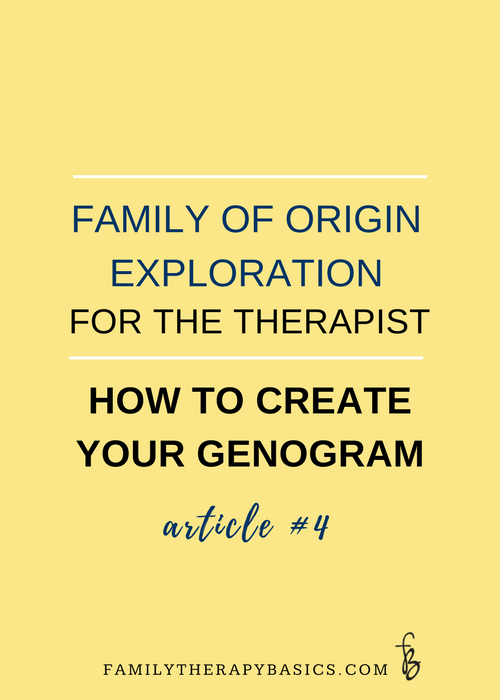So far, I’ve covered why family of origin exploration is important for therapists, as well as the common fears that accompany facing our parents. If you haven’t yet read these first two articles, please read them before continuing.
In this post, I explain how to begin the process of family of origin (FOO) exploration.
Disclaimer: This process is not linear, nor is it the only way to begin exploring your FOO experience. This is only one method for beginning to understand your family context. The process moves you from understanding to engagement. Understanding on its own is very powerful, but it is even more liberating when it is put into action within relationships.
The following 3 steps will help you get started.
Before beginning this process, please consider the following:
In case you need it, please formalize a supportive relationship to have available during your FOO exploration in the form of a regularly scheduled chat about your new FOO efforts with a friend or colleague. You can also join my Facebook group for ongoing support.
I recommend recording your ideas. Reflecting in writing, in my experience, is the best way to honor your past and present views. Buy a journal, and use it throughout your exploration.
Consider meeting with a well-trained therapist or coach that can support and deepen the impact of this journey
Step 1: Read Bowen's Chapter
If you’d like to begin the process of family of origin exploraiton, then it’s useful to learn more about the process, as well as its originator. Bowen (1972) personally applied his theoretical ideas to his family of origin, and his example sheds light on the benefits and barriers that you may experience.
You can read a portion of Bowen's experience here (for free). You can also learn more about his experience, and the rest of his work, by reading his book, Family Therapy in Clinical Practice.
Step 2: Observe your FOO experience, and See Yourself as a Member of the Family System
Yes, even therapists fall into the trap of telling themselves, “I’m not like them.” But, whatever we are "like" is a result of the systems that have defined us. As you go through this process, be curious about your tendencies, habits, preferences, and see them as connected to your family of origin. Wonder how they may have developed as an acceptance, reaction, or response to family members’ ways of being. Let this be okay.
Seeing ourselves as part of our systems helps us accept our evolving selves, and their many influences. It also bases our exploration in second-order, rather than first order cybernetics--concepts central to systems theory and the practice of family therapy:
First order cybernetics keeps us as observers of the system (in this case, the family system), believing that we can exist and conclude separate from its influence. Second order cybernetics allows us to recognize that even as we observe and analyze, we are influenced by the system, as a member of it (Becvar & Becvar, 1999). We are (and were always) co-participants in our family system.
Step 3: Reflect On What You Learned From Your FOO
To begin this reflection, list at least 5 areas in your life that you’d like to examine. Usually, it’s our dissatisfactions that are the easiest to recognize, such as our emotional reactions, frustrating habits, or relationship patterns. (At the end of this post, you will find a free downloadable list of ideas.)
Analyze each area based on what you learned in general, as well as what you learned from each parent or caretaker. Consider: How does this learning impact you now? How do you believe it has influenced your choices in this area?
As you analyze, journal or record your thoughts. You may find that using childhood and family pictures may help you in your reminiscing.
Attach an experience to each lesson--a memory of when the “teaching” was demonstrated. This will help you put the learning in context, so that you can consider your age, and your family's circumstances at that time.
Summary
These first three steps are about gaining understanding. Understanding is the foundation for developing differentiation of self and initiating relational and self change (Bowen, 1972). In upcoming articles, you will continue to expand on this understanding through learning about your significant family members, as well as your intergenerational family patterns.
I've created a list of 40 ideas to help you complete Step 3 of your FOO exploration. Download here:
Let's Chat
What is one area in your life that you'd like to examine? Let me know in the comments below.







